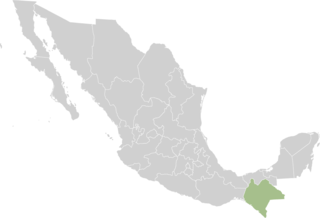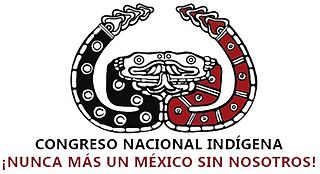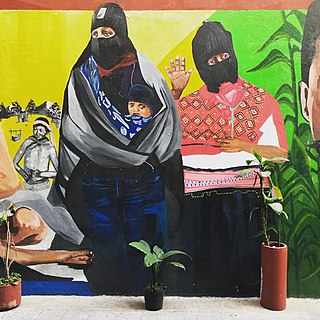Related Research Articles

The Zapatista Army of National Liberation, often referred to as the Zapatistas, is a far-left political and militant group that controls a substantial amount of territory in Chiapas, the southernmost state of Mexico.

Samuel Ruiz García was a Mexican Catholic prelate who served as bishop of the Diocese of San Cristóbal de las Casas, Chiapas, from 1959 until 1999. Ruiz is best known for his role as mediator during the conflict between the Zapatista Army of National Liberation (EZLN) and the Institutional Revolutionary Party (PRI), a Mexican political party which had held power for over seventy years, and whose policies were often disadvantageous to the indigenous populations of Chiapas. Inspired by Liberation Theology, which swept through the Catholic Church in Latin America after the 1960s, Ruiz's diocese helped some hundreds of thousands of indigenous Maya people in Chiapas who were among Mexico's poorest marginalized communities.
Pietro Ameglio is a Uruguayan-born naturalized Mexican citizen and Gandhian civil rights and peace activist best known for his role in promoting nonviolence and creating a movement for peace and anti-militarism in Mexico.
Subcomandante Elisa is a Mexican activist from Monterrey, Nuevo León. In the 1980s and early 90s, she served as a subcomandante in the Zapatista Army of National Liberation (EZLN). She was arrested in February 1995 in connection with the 1994 Zapatista uprising. In 1996, the Mexican government acknowledged it was a wrongful arrest and acquitted her of all charges. Today, she is a professor at the Autonomous University of Social Movements.

Comandanta Ramona was an officer of the Zapatista Army of National Liberation (EZLN), a revolutionary indigenous autonomist organization based in the southern Mexican state of Chiapas. She led the Zapatista Army into San Cristóbal de las Casas in 1994, and was the first Zapatista to appear publicly in Mexico City.
The Other Campaign is a political program by the Zapatista Army of National Liberation for the recognition and protection of indigenous rights and autonomy in Mexico. This program began in January 2006, and sent Subcomandante Marcos, the main spokesperson for the campaign, to travel across Mexico for several months. This tour was intended to create connections among the Zapatistas and pre-existing resistance groups throughout Mexico.
Las Abejas is a Christian pacifist civil society group of Tzotzil Maya formed in Chenalhó, Chiapas in 1992 following a familial property dispute that left one person killed. When members of the community took the injured man to the nearest town for medical attention, they were accused of attacking him themselves and jailed. When family members realized what had happened, they began a pilgrimage on foot to San Cristóbal de las Casas. Along the way, Christian pacifists in other villages joined the group, which is dedicated to peace, justice, and anti-neoliberalism. Las Abejas freed their companions and grew as an organization.
Clemencia Rodriguez is a Colombian US-based media and communication scholar recognized for her role in establishing and promoting the field of alternative media studies in English language media studies, notably through her work on 'citizens' media,' a term she coined in her 2001 book Fissures in the Mediascape and through co-founding and facilitating OURMedia/NUESTROSMedios, a global network of researchers and practitioners of alternative media, community media and citizens' media, currently the biggest network of its kind with over 500 members in over 40 countries.
The San Andrés Accords are agreements reached between the Zapatista Army of National Liberation and the Mexican government, at that time headed by President Ernesto Zedillo. The accords were signed on February 16, 1996, in San Andrés Larráinzar, Chiapas, and granted autonomy, recognition, and rights to the indigenous population of Mexico.

Neozapatismo or neozapatism is the political philosophy and practice devised and employed by the Zapatista Army of National Liberation, who have instituted governments in a number of communities in Chiapas, Mexico since the beginning of the Chiapas conflict. According to its adherents, it is not an ideology: "Zapatismo is not a new political ideology or a rehash of old ideologies. .. There are no universal recipes, lines, strategies, tactics, laws, rules or slogans. There is only a desire: to build a better world, that is, a new world." Many observers have described neozapatismo as libertarian socialist, anarchist, or Marxist.

The Chiapas conflict comprised the 1994 Zapatista uprising, the 1995 Zapatista crisis and ensued tension between the Mexican state and the indigenous peoples and subsistence farmers of Chiapas from the 1990s to the 2010s.
On January 1, 1994, the Zapatista Army of National Liberation (EZLN) coordinated a 12-day uprising in the state of Chiapas, Mexico in protest of the enactment of the North American Free Trade Agreement. The rebels occupied cities and towns in Chiapas, releasing prisoners and destroying land records. After battles with the Mexican Army and police, a ceasefire was brokered on January 12. Around 300 people were killed.

Rafael Sebastián Guillén Vicente is a Mexican insurgent, the former military leader and spokesman for the Zapatista Army of National Liberation (EZLN) in the ongoing Chiapas conflict, and a prominent anti-capitalist and anti-neoliberal. Widely known by his initial nom de guerreSubcomandante Insurgente Marcos, he has subsequently employed several other pseudonyms: he called himself Delegate Zero during the Other Campaign (2006–2007), and since May 2014 has gone by the name Subcomandante Insurgente Galeano, which he adopted in honor of his fallen comrade Jose Luis Solis Lopez, his nom de guerre being Galeano, aka "Teacher Galeano". Marcos bears the title and rank of Subcomandante, as opposed to Comandante, because he is under the command of the indigenous commanders who constitute the EZLN's Clandestine Revolutionary Indigenous Committee's General Command.
Radio Insurgente is the official voice of the Zapatista Army of National Liberation (EZLN).The radio station has been operating since August 2003 and it is independent from the Mexican government. Its broadcasting location is unknown. Radio Insurgente's content is focused on promoting the ideas and struggles of the Zapatista movement. Radio Insugente transmits programs in Spanish and in the indigenous languages Tzotzil, Tzeltal, Chol and Tojolabal. According to their website, they transmit "from various places in Chiapas directed to the Zapatista bases, the insurgentes and milicians, the commanders and local people in general". No new programs have been posted on the website since 2009, but CDs are on sale on the site and users can listen to previous content.
Zapatista Coffee Cooperatives primarily operate in Chiapas, the southernmost state of Mexico following Zapatismo ideology.

Women have been influential in the Zapatista Army of National Liberation (EZLN) Ejército Zapatista de Liberación Nacional, a revolutionary leftist group in Chiapas, Mexico, by participating as armed insurgents and civil supporters. In the 1990s, one-third of the insurgents were women and half of the Zapatista support base was women. The EZLN organization style involved consensus and participation by everyone, including women and children. Therefore, one aspect of the EZLN's ideology was gender equality and rights for women. After the Zapatista uprising in Chiapas, the EZLN announced the Women's Revolutionary Law which was a set of ten laws that granted rights to women regarding marriage, children, work, health, education, political and military participation, and protected women from violence. Prominent figures who joined the movement early on such as Comandante Ramona and Major Ana Maria encouraged other women to join the Zapatistas.

Rebel Zapatista Autonomous Municipalities are de facto autonomous territories controlled by the neo-Zapatista support bases in the Mexican state of Chiapas. They were founded following the Zapatista uprising which took place in 1994 and are part of the wider Chiapas conflict. Despite attempts at negotiation with the Mexican government which resulted in the San Andrés Accords in 1996, the region's autonomy remains unrecognized by that government.
Indigenous feminism is an intersectional theory and practice of feminism that focuses on decolonization, Indigenous sovereignty, and human rights for Indigenous women and their families. The focus is to empower Indigenous women in the context of Indigenous cultural values and priorities, rather than mainstream, white, patriarchal ones. In this cultural perspective, it can be compared to womanism in the African-American communities.

The National Indigenous Congress is an organization of communities, nations, towns, neighbourhoods and indigenous tribes of Mexico. In its own words, the CNI is "... a space of unity, reflection and organization of the indigenous peoples of Mexico, promoting the integral reconstitution of the original peoples and the construction of a society in which all cultures, all the colors, all the towns that we are Mexico". Since its foundation, among several activities, five national congresses have been held.

Comandanta Esther is the nom de guerre of a revolutionary in the Zapatista Army of National Liberation (EZLN) of Chiapas, Mexico, created for indigenous people's rights. She is considered a high ranking woman in the EZLN. Military "commanders" have no actual military or governmental power and are simply spokespeople for the movement. Comandanta Esther is best known for her March 2001 speech to the Congress of the Union at the San Lazaro Legislative Palace in Mexico City, in which she spoke for constitutional recognition of indigenous people and the difficulty that indigenous women face in Mexico, demanded that their rights be acknowledged. Her work has helped inspire women activists to speak up in and join leadership roles in their communities in Mexico.
References
- ↑ "About Us". Americas Media Initiative. Retrieved 13 November 2016.
- 1 2 Chiapas Media Project. Tri-fold brochure. Chicago: Chiapas Media Project. Interference Archive Collection.
- 1 2 3 4 5 Chiapas Media Project. Single page flyer. Chicago: Chiapas Media Project. Interference Archive collection.
- ↑ Gooding, Susan (November 14, 2005). "Zapatistas, Chiapas Media Project, and Paco Vazquez". News from Indian Country.